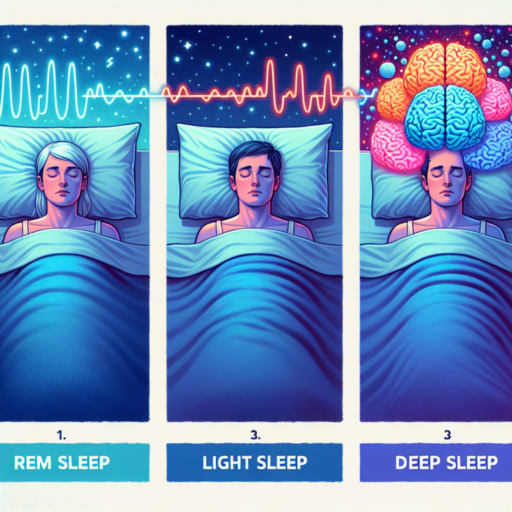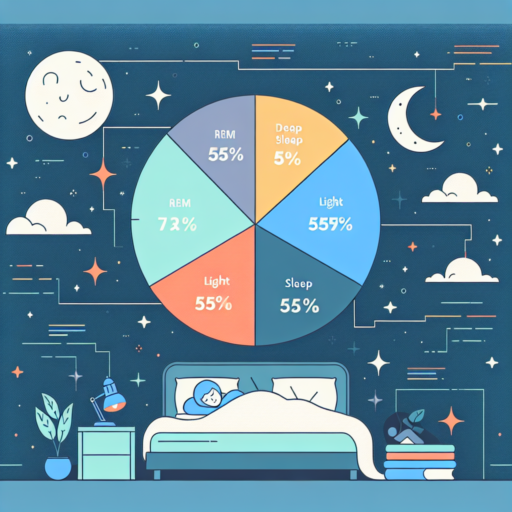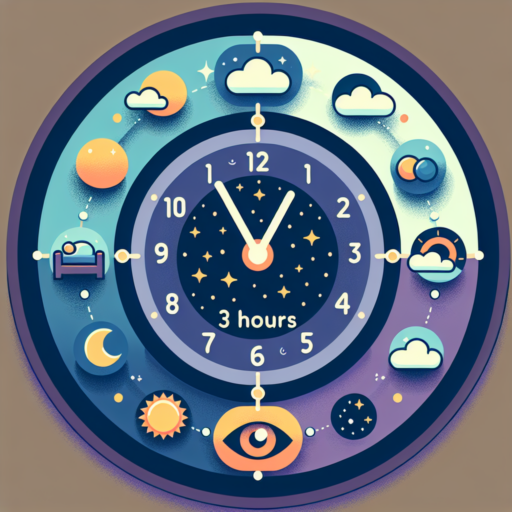Understanding REM Sleep, Light Sleep, and Deep Sleep
When we discuss the intricacies of sleep, understanding the differences between REM sleep, light sleep, and deep sleep becomes crucial. Each phase plays a unique role in our sleep cycle, affecting everything from how we feel when we wake up to our overall health and well-being. Recognizing these stages can substantially improve our sleep quality, ensuring we wake up feeling refreshed and recharged.
REM Sleep, or Rapid Eye Movement Sleep, is known for its dream-rich state. It’s in this phase that the brain is almost as active as when we’re awake, which explains why most of our dreaming occurs during REM sleep. This stage is essential for cognitive functions such as memory consolidation and mood regulation. Unlike light or deep sleep, REM sleep energizes the brain, playing a crucial role in our learning and emotional health.
Light Sleep, although often underrated, serves as the bridge between being awake and the deeper stages of sleep. During this phase, our body begins to relax, heart rate and breathing slow down, but we can still be easily awakened. Light sleep enhances mental and physical recovery, preparing us for the deeper, more restorative stages of sleep.
Deep Sleep is the most restorative stage, vital for physical recovery, growth, and development. This is when the body repairs tissues, builds bone and muscle, and strengthens the immune system. The heart rate and breathing rate reach their lowest levels during deep sleep, making it harder to wake up from this stage. It’s during deep sleep that we truly disconnect from our surroundings, ensuring a rejuvenating rest.
The Role of REM Sleep in Your Sleep Cycle
REM sleep, or Rapid Eye Movement sleep, plays a crucial and fascinating role in our overall sleep cycle. This phase is characterized by rapid movements of the eyes, and it is during REM sleep that most dreaming occurs. Unlike other stages of sleep, REM provides unique benefits critical for emotional regulation, memory consolidation, and cognitive function.
During the sleep cycle, REM sleep typically occurs after the first 90 minutes of falling asleep and cycles in and out approximately every 90 minutes thereafter. This stage becomes proportionally longer towards the morning. It’s worth noting that the quality and duration of REM sleep can be impacted by a variety of factors, including stress, alcohol consumption, and various sleep disorders.
Research suggests that REM sleep facilitates brain plasticity, which is essential for learning and memory. By reorganizing and consolidating the day’s memories, REM sleep plays an integral part in helping us retain new information. Moreover, it’s during REM that the brain processes emotions and stress, promoting mental health and emotional resilience.
No se han encontrado productos.
Light Sleep: Its Importance and Functions
Understanding the role of light sleep is crucial in recognizing its impact on our overall health and well-being. Often underestimated, light sleep serves as a foundational phase in our sleep cycle, facilitating numerous physiological and psychological functions. This phase, typically characterized by a decrease in body temperature and heart rate, prepares our body and mind for the deeper stages of sleep.
One of the key functions of light sleep is its role in memory consolidation. Despite being a lighter stage of sleep, it plays an integral part in processing information and transferring it from short-term to long-term memory. This process is essential for learning new information, skills, and retaining important experiences. Additionally, light sleep acts as a transitional period, allowing our body to ease into the deeper, more restorative stages of sleep smoothly.
Moreover, light sleep contributes significantly to the body’s recovery process. During this stage, the body undergoes a mild form of restoration, preparing the muscles, tissues, and brain for the intensive recovery that occurs during deep sleep. This highlights the essential nature of light sleep in maintaining physical health, cognitive function, and emotional well-being.
Deep Sleep: What It Is and Why You Need It
Deep sleep, also known as slow-wave sleep, plays a crucial role in your overall health and well-being. This stage of sleep is characterized by slow brain waves, known as delta waves, and is a time when your body is able to repair itself and restore its energy levels. Understanding the importance of deep sleep is essential for anyone looking to improve their sleep quality and, by extension, their overall quality of life.
Diving into the physiological benefits, deep sleep aids in the consolidation of memories, a process vital for learning and retention. During this phase, your brain transfers short-term memories to long-term storage, ensuring that new information is safely stored and easily retrievable. Furthermore, deep sleep is the time when the body releases growth hormones, which are indispensable for muscle repair, cell regeneration, and the strengthening of the immune system.
How to Increase Deep Sleep
Enhancing the quality of your deep sleep can be achieved through several strategies. Maintaining a regular sleep schedule, reducing exposure to screens before bedtime, and creating a comfortable sleep environment free of disturbances can significantly improve your sleep quality. Additionally, practices such as meditation and avoiding caffeine late in the day can further promote more restful deep sleep.
Comparing REM, Light, and Deep Sleep: Key Differences
Understanding the variations between REM (Rapid Eye Movement), light, and deep sleep is crucial for comprehending how sleep affects our overall health and well-being. Each stage plays a unique role in the sleep cycle, influencing everything from memory consolidation to physical rejuvenation.
REM Sleep: The Dream Phase
REM sleep, often referred to as the dream phase, is characterized by rapid eye movement, increased brain activity, and vivid dreams. This phase is crucial for memory consolidation, emotional regulation, and brain development. Unlike light and deep sleep stages, REM sleep provides the brain with the ability to integrate complex emotional experiences with cognitive processes.
Light Sleep: The Transition Phase
Light sleep acts as a transition phase between being awake and deeper stages of sleep. During this stage, the body begins to slow down, with decreases in heart rate, breathing, and muscle activity. It’s during light sleep that the body can easily be awakened, making this phase less restorative than deep sleep. However, it’s essential for overall sleep duration, making up a significant portion of our nightly rest.
Deep Sleep: The Restoration Phase
Deep sleep, or slow-wave sleep, is the most restorative phase, crucial for physical recovery, immune system strengthening, and growth hormone release. During deep sleep, the body repairs tissues, strengthens the immune system, and consolidates memories, making it fundamental for physical health and cognitive function. Unlike REM and light sleep, deep sleep makes it more challenging for someone to be awakened, indicating its profound restorative properties.
How to Achieve a Balanced Sleep Cycle: Tips for Better REM, Light, and Deep Sleep
Achieving a balanced sleep cycle is essential for both physical and mental well-being. The quality of your sleep significantly impacts your daily energy levels, mood, and overall health. A well-balanced sleep cycle includes the right amount of rapid eye movement (REM) sleep, light sleep, and deep sleep. By understanding and implementing a few strategic habits into your nightly routine, you can improve the quality of your sleep and promote a healthier life.
Establish a Consistent Sleep Schedule
One of the most effective ways to balance your sleep cycle is by establishing and sticking to a consistent sleep schedule. Going to bed and waking up at the same time every day, even on weekends, helps regulate your body’s internal clock. This consistency can significantly improve the transition between light, deep, and REM sleep stages, making your sleep cycle more efficient and restorative.
Optimize Your Sleep Environment
Creating an environment conducive to good sleep is crucial for achieving a balanced sleep cycle. This can include adjusting the room temperature to a cool, comfortable setting, minimizing exposure to noise and light, and investing in a comfortable mattress and pillows. Each of these elements can have a substantial impact on the quality of each sleep stage. Also, consider incorporating relaxation techniques before bed, such as reading or meditation, to help your mind and body prepare for sleep.
Limit Exposure to Electronics
In today’s digital age, technology can significantly disrupt our sleep cycles. The blue light emitted by smartphones, tablets, and computers can interfere with the production of melatonin, the hormone responsible for regulating sleep cycles. Limiting exposure to these devices at least an hour before bedtime can promote better sleep quality, including more restful REM and deep sleep stages. For those who must use devices in the evening, consider using blue light filters to minimize the impact on your sleep cycle.
The Impact of REM, Light, and Deep Sleep on Your Health
Understanding the impact of different sleep stages, including REM, light, and deep sleep, is crucial for grasping the complex relationship between sleep and our overall health. Each of these sleep stages plays a vital role in bodily restoration and brain health, influencing everything from memory retention to physical recovery. In this light, exploring the specific contributions of each sleep phase can unveil the mechanisms through which sleep impacts our well-being.
REM Sleep and Mental Health
REM (Rapid Eye Movement) sleep is profoundly intertwined with our mental and emotional health. This stage is closely associated with dreaming and is believed to contribute to processing emotions, consolidating memories, and facilitating learning. Studies indicate that inadequate REM sleep can lead to increased anxiety, stress, and depression, showcasing the critical nature of this phase in maintaining mental well-being.
Light Sleep and Cognitive Function
Though often underappreciated, light sleep serves as the transition between waking and deeper sleep stages. It occupies a larger proportion of our sleep cycle and is essential for modulating mood and cognitive sharpness. During light sleep, the brain processes daily experiences and rejuvenates itself for the next day. This stage is pivotal in enhancing learning capabilities and memory optimization, demonstrating the importance of sufficient light sleep for cognitive health.
Deep Sleep and Physical Recovery
Deep sleep, or slow-wave sleep, is the powerhouse of physical health restoration. It is during this state that the body repairs tissues, builds bone and muscle, and strengthens the immune system. The heart rate slows, and blood pressure drops, allowing for a period of profound restorative rest. The release of growth hormones during deep sleep underscores its significance in physical development and recovery, marking it as essential for overall physical health.
Identifying and Improving Your Sleep Patterns: REM vs Light vs Deep Sleep
Understanding the different stages of sleep is crucial for identifying and improving your sleep patterns. In the realm of rest, three primary types stand out: REM (Rapid Eye Movement) sleep, light sleep, and deep sleep. Each phase plays a distinctive role in the restoration of our body and mind. By deciphering the characteristics and benefits of REM, light, and deep sleep, individuals can take proactive steps towards enhancing the quality of their nightly rest.
Characteristics of REM Sleep
REM sleep, known for its rapid eye movements, is a critical stage where dreams occur most vividly. This phase is essential for emotional regulation and memory consolidation. During REM sleep, your brain is almost as active as when you’re awake, processing information and fortifying neural pathways. Identifying when you enter this sleep stage can help pinpoint if you’re achieving a restorative night’s sleep, essential for optimal cognitive functioning.
Understanding Light and Deep Sleep
Light sleep serves as the entry point into deeper sleep stages and is marked by slower breathing and heart rate. Although considered less restorative, it’s vital for physical recovery and setting the stage for deep sleep. Deep sleep, on the other hand, is the most rejuvenative phase, characterized by slow wave activity in the brain. This is when the body repairs muscles, consolidates memories, and detoxifies, making it indispensable for overall health and well-being. Improving your deep sleep percentage can significantly enhance sleep quality and daytime energy.
Technologies and Techniques to Monitor REM, Light, and Deep Sleep
Understanding the different stages of sleep is crucial for assessing sleep quality and identifying disorders. REM, light, and deep sleep each play unique roles in our health and well-being. Advances in technology have made it possible to monitor these stages more accurately than ever before. This overview explores the most prominent technologies and techniques used to track these vital sleep stages.
Wearable Sleep Trackers
Wearable devices have revolutionized the way we monitor sleep, providing insights into REM, light, and deep sleep phases. These devices, often worn on the wrist or as a headband, use sensors to track movement and heart rate variations. By analyzing these biometrics, they can approximate the sleep stages with a considerate degree of accuracy. Brands like Fitbit, Garmin, and Withings offer some of the most popular wearable sleep trackers, helping users understand their sleep patterns and improve sleep quality.
Home Polysomnography (PSG) Devices
Traditionally used in sleep studies, polysomnography (PSG) is a comprehensive recording of the biophysical changes that occur during sleep. Recent advancements have led to the development of home PSG devices, making it easier for users to monitor their sleep stages without spending the night in a sleep lab. These devices track a wide array of physiological data, including brain waves (EEG), eye movements, muscle activity, and heart rhythm. While more invasive than wearable trackers, home PSG devices offer a more detailed analysis of sleep, making them invaluable for diagnosing sleep disorders.
Each of these technologies and techniques has its advantages and limitations, but together, they provide a comprehensive toolkit for monitoring REM, light, and deep sleep. As research progresses, we can expect to see even more innovative solutions for sleep monitoring, providing individuals with deeper insights into their sleep health and helping them make informed decisions about their lifestyle and health care.
FAQs: Common Questions About REM, Light, and Deep Sleep Answered
Understanding the complexities of sleep phases, including REM, light, and deep sleep, is crucial to unraveling how our body restores itself nightly. Each stage has its unique features and impact on our overall health and well-being. Below, we dive into some of the most common questions surrounding these essential sleep stages.
What is REM Sleep and Why is it Important?
REM sleep, or Rapid Eye Movement sleep, is a phase where dreams are most vivid, and brain activity closely resembles that of being awake. This stage is critical for memory consolidation, processing emotions, and supporting cognitive functions. The importance of REM sleep cannot be overstated, as it plays a vital role in learning and mental health.
How do Light and Deep Sleep Differ?
Light sleep serves as the transition phase between wakefulness and deeper stages of sleep, acting as a bridge to more restorative sleep phases. During light sleep, the body begins to relax, with slower breathing and heart rate. In contrast, deep sleep is the most restorative phase, crucial for physical recovery, cell regeneration, and immune system strengthening. Deep sleep also helps in refreshing the mind, making it essential for optimal health and performance.




